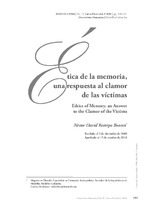Mostrar el registro sencillo del ítem
Ética de la memoria, una respuesta al clamor de las víctimas
| dc.contributor.author | Restrepo Bonnet, Néstor David | |
| dc.coverage.spatial | Seccional Medellín | spa |
| dc.date.accessioned | 2021-02-05T17:52:33Z | |
| dc.date.available | 2021-02-05T17:52:33Z | |
| dc.date.issued | 2010 | |
| dc.identifier.uri | http://hdl.handle.net/20.500.11912/7892 | |
| dc.description | p. 193 - 211 | spa |
| dc.description.abstract | La historia del hombre es una historia de guerras e intentos de soluciones, una historia de víctimas y victimarios, de perdedores y supuestos ganadores. El siglo XX fue la radicalización de esta historia; los campos de concentración en la Segunda Guerra Mundial no sólo fueron la lucha entre pueblos, entre poderes, entre ideologías, sino que se convirtieron en la muestra de todo lo que el ser humano es capaz de hacer en su máxima expresión de animalidad y a la vez la imagen histórica de cualquier intento de robar la libertad. Se pretende entonces plantear una cultura de la memoria, la cual supone la búsqueda permanente del otro como aquel que sufre las consecuencias de la historia. La ética de la memoria obliga a la Filosofía a no permanecer impasible ante el horror y la muerte, la amenaza es la negación del otro, si la alteridad muere, muere la ética lo cual será un paso seguro a la barbarie. | spa |
| dc.description.abstract | The history of mankind is a history of wars and attempts at solutions, a story of victims and perpetrators, alleged losers and winners. The twentieth century was the radicalization of this history; the concentration camps in World War II were not only the struggle between peoples, between branches, between ideologies, but became the example of the brutality that men can reach, while the historical image of any attempt to steal freedom. We propose then a culture of memory, which involves the constant search for the “other” as one who suffers the consequences of history. The ethics of memory requires philosophy to not remain indifferent to the horror and death. The threat is the denial of “the other”, if the otherness dies, so does ethics, which will be an inevitable step to barbarism. | spa |
| dc.format.mimetype | application/pdf | |
| dc.language.iso | spa | |
| dc.publisher | Universidad Pontificia Bolivariana | spa |
| dc.relation.ispartof | Pensamiento humanista | spa |
| dc.rights | Attribution-NonCommercial-NoDerivatives 4.0 International | * |
| dc.rights.uri | http://creativecommons.org/licenses/by-nc-nd/4.0/ | * |
| dc.subject | Víctimas | spa |
| dc.subject | Ética | spa |
| dc.subject | Memoria | spa |
| dc.subject | Barbarie | spa |
| dc.subject | Solidaridad | spa |
| dc.subject | Victims | spa |
| dc.subject | Ethics | spa |
| dc.subject | Memory | spa |
| dc.subject | Barbarism | spa |
| dc.subject | Solidarity | spa |
| dc.title | Ética de la memoria, una respuesta al clamor de las víctimas | spa |
| dc.title.alternative | Ethics of Memory, an Answer to the Clamor of the Victims | spa |
| dc.type | article | spa |
| dc.rights.accessRights | openAccess | spa |
| dc.type.hasVersion | publishedVersion | spa |
| dc.description.sectional | Medellín | spa |
| dc.identifier.instname | instname:Universidad Pontificia Bolivariana | spa |
| dc.identifier.reponame | reponame:Repositorio Institucional de la Universidad Pontificia Bolivariana | spa |
| dc.identifier.repourl | repourl:https://repository.unab.edu.co/ |
Ficheros en el ítem
Este ítem aparece en la(s) siguiente(s) colección(ones)
-
No. 7 (2010) [13]


